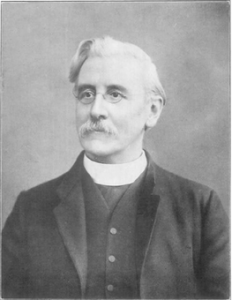| Robert Stuart de Courcy Laffan became Rector of St. Stephen’s, Walbrook in 1899, and was able to balance his service between the needs of his parishioners and the struggle to ensure that the Olympic message was made more widely known. |
 In 1892, at a jubilee of the French Union of Athletic Sports Societies, Baron Pierre de Coubertin introduced the idea of a modern Olympics. His idea was fairly vague, and it seems that even Coubertin himself did not have a clear idea what form such games would take. Two years later, Coubertin organized a meeting which brought together 79 delegates from 12 countries to discuss how to revive the Olympic games. The meeting established the first International Olympic Committee, and the basic framework of having the games every four years, with the first to take place in Greece, was decided upon. http://history1800s.about.com/od/sports/a/Coubertin.htm
In 1892, at a jubilee of the French Union of Athletic Sports Societies, Baron Pierre de Coubertin introduced the idea of a modern Olympics. His idea was fairly vague, and it seems that even Coubertin himself did not have a clear idea what form such games would take. Two years later, Coubertin organized a meeting which brought together 79 delegates from 12 countries to discuss how to revive the Olympic games. The meeting established the first International Olympic Committee, and the basic framework of having the games every four years, with the first to take place in Greece, was decided upon. http://history1800s.about.com/od/sports/a/Coubertin.htm
At the Le Havre Congress of the International Olympic Committee in 1897 Robert Stuart de Courcy Laffan represented the Headmasters’ Conference – the association of headmasters of the English Public Schools. Laffan was an unlikely “Olympic” emissary; as neither a physical educator nor an exceptional athlete but he … brought … to Le Havre a message of the true commitment for the value of organised physical activity …
When Laffan spoke … the effect of this newly found ally led [Baron Pierre de] Coubertin to be “… convinced that a new collaborator of the most invaluable quality had come down from the heavens to help us.” … the friendship that developed between Coubertin and Laffan was to be “profound and stable … In his presentation Laffan spoke of the broader value of sporting activity. He said that it was through physical exercise that man came to know himself better, and that this in turn would lead to the establishment of the Brotherhood of Man.
The endorsement of both the spiritual and physical benefits of sport were much appreciated by the audience. He presented a different slant on the potential contained within the concept of Olympism: a more overtly philanthropic aim which would have been recognised by the audience as highly palatable to their respective supporters at home.
Read more
Laffan was not a figurehead or helmsman … but he was an extraordinary workhorse. It was said of Laffan that he possessed a “silver tongue” – what we might commonly call today “the gift of gab.” The inscription on the 300 year old clock presented to Laffan by his co-workers on the British Olympic Council after the London Games thanked him for the “…kindly, tactful and wholehearted manner” in which he had carried out every duty. He is said to have served “nobly and disinterestedly.”
To Laffan there was significant spiritual meaning in this timely arrival of new opportunity … Robert Laffan attributed many qualities to the Olympic Movement as the vehicle for the improvement of mankind’s ability to live and work together. Sometimes unrealistic in his claims for what is now such an important world phenomenon, Laffan provided great inspiration for others in the early days by devoting all his enthusiasm and working capacity to help pave the way for the future. In his view the Olympic Movement existed to achieve: . . .the perfect physical development of a new humanity; the spreading all over the world of a spirit of sport – that is the spirit of the truest chivalry; and the drawing together of all the nations of the earth in the bonds of peace and mutual amity.
To Laffan the Olympic Movement was everything: It is to me a privilege in itself to have been allowed to do something for what I consider one of the greatest concerns on earth, the cause which has as its supreme ideal ‘Peace on earth and goodwill towards men’.
(Adapted from ‘Research Notes: A Noble Ally and Olympic Disciple: The Reverend Robert S. de Courcy Laffan, Coubertin’s ‘Man’ in England’ by Steve Bailey, Director of Sports, Winchester College, and published in OLYMPIKA: The International Journal of Olympic Studies Volume VI – 1997 – http://library.la84.org/SportsLibrary/Olympika/Olympika_1997/olympika0601d.pdf
Read less
